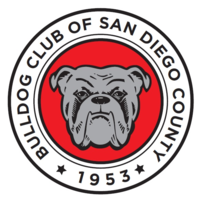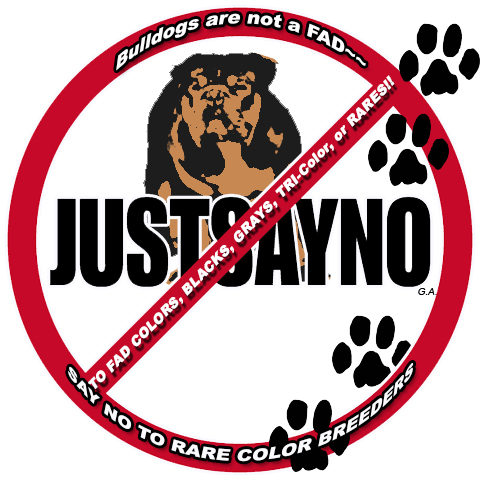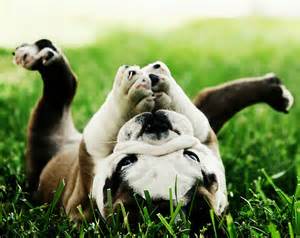Is a Bulldog the right breed for me?
As much as we love Bulldogs, they are not the right fit for every family. They need attention and structure. Their grooming needs are minimal, but they do need their wrinkles and ears cleaned, and nails trimmed regularly. They are not all “couch potatoes” and will need regular exercise and mental stimulation. Bulldogs need to be indoors in very hot weather and are not suitable as a jogging companion. A well trained Bulldog is generally wonderful with children.
What sources should I avoid when looking for a puppy?
Pet Stores: Never buy a puppy from a pet store! We cannot stress this enough. Reputable breeders will not sell pups to pet stores, as they cannot guarantee the pup will end up in a suitable home. The source of puppies for pet stores is from puppy mills. These are commercial facilities, often in the Midwest, that breed dogs for profit. No reputable breeder will ever be involved in this. The "mill dogs" are often kept in horrid conditions in small wire cages, bred until they are no longer useful as breeding stock. They usually do not meet the Bulldog breed standard, and often times these puppies grow up NOT looking like the Bulldog you imagined. They are commonly riddled with health problems, as well. Note the signs on kennel windows in most pet stores indicating that the puppies are from the mid-West, usually Kansas and Missouri. They are often removed from their mothers at 4 weeks of age, much too soon, which can cause behavioral and psychological damage. If they are not sold by a certain age, they are often euthanized, and a younger pup is brought in to take its place. Prices are often twice what a good breeder would charge. Don’t be tempted to “rescue” one of these pups, as you will only be supporting the mills and further breeding.
Craig’s List/Newspaper Ads: These ads are often placed by backyard breeders and those out solely to make a profit from a litter of puppies. These are people who simply buy two dogs and breed them, with no regard for correct structure, temperament, or health. They know nothing about the pedigree or genetic history of their dog(s), have no idea what the Bulldog Breed Standard is, and often lack the knowledge for proper health care. Rarely is health testing done and little attention is given to select the best mate to complement their female, instead they use whatever dog is available. You will find that they often use their puppy sales to supplement their income, if not be the sole source of their income, so they are very motivated to pass inferior pups on to unsuspecting buyers.
High-Volume Internet websites: Almost anyone can put up a flashy website. Here are some ways to determine whether the breeder is reputable. The correct name of this breed is “Bulldog”. If you see sites with “English Bulldogges”, "Olde English Bulldogs", "Victorian Bulldoggs", etc., you can assume the sellers are not BCA members and the dogs may not even be AKC registered. Another sign is if a website advertises they always have puppies available. Bulldogs are difficult to whelp, so this is a red flag they are likely brokering puppies domestically or importing them from other countries. Sites that sell many different breeds of puppies are brokers – they buy entire litters, usually from sources outside the US, and deal with hundreds of puppies annually. Websites that offer a constant supply of puppies, ship anywhere, and sell pups with unusual colors or sizes are NOT reputable breeders.
Where is the best place to find a healthy, Breed-Standard Bulldog?
In the same way that licensed physicians belong to the American Medical Association, reputable breeders belong to the Bulldog Club of America and to a local Bulldog club. As members, they are required to adhere to a Code of Ethics to practice ethical breeding standards, promote the health and welfare of the breed, and to strive to produce Bulldogs that will have a true Bulldog appearance and loving nature. Do not confuse AKC papers with membership in a breed club. AKC does not regulate the quality of dogs; they are a registry service that only records and provides information on dogs' parentage.
A good breeder spends thousands on breeding quality animals, keeping them in good health, showing them, and health testing them. The purpose of dog shows is a means to evaluate breeding stock. We enter shows to obtain an expert judge’s opinion as to whether or not our dogs meet the Breed Standard. Only the best dogs are selected to represent the breed and produce the next generation. This ensures that in years to come, Bulldogs will continue to look like the dogs we know and love today. Show breeders have their own personal careers and do not live off of puppy sales. They spend far more on their dogs than they earn in puppy sales. They have a reputation to protect and pledge to do no harm to the breed. Their main concern is the health, structure, and temperament of their dogs.
Contact your local Bulldog club and ask for breeder referrals. You will be connected with experienced breeders who will be an ongoing source of information and assistance for the life of your bulldog.
What about “Mini”, “American”, "Victorian" and “Olde English” Bulldogs?
These names should raise a red flag as they are used as ploys to market a Bulldog that is "different" than a correct BCA/AKC Bulldog. You will find these dogs do not conform to the BCA Breed Standard and are often registered with non-legitimate registries. Claims are made these dogs are healthier, but there are no veterinary or scientific studies to prove this. And, there is no such thing as a mini Bulldog, they are not recognized by BCA or AKC, they are merely undersized and marketed as "mini" to extract more money from buyers.
What should I expect when I contact a breeder?
Please realize that good breeders care deeply about their puppies and want to be sure they will live in a suitable forever home. The breeder may ask questions about your home and work situation to determine if there will be adequate supervision for a young pup. They will guide you in choosing the pup with the best temperament for you and for your family. Club breeders will provide written materials on feeding, care and training of your Bulldog pup, and will welcome any questions you might have. They will be an ongoing source of advice and information for the life of your pup.
Why are Bulldogs so expensive?
There are a number of reasons, mainly the expenses incurred by the breeder before he ever gets a puppy on the ground. These costs include fees for progesterone testing (upwards of $200-$400), stud fee ($850 - $1,000), semen collection/shipping ($250 - $300), semen implant (anywhere from $250 - $600+, depending on the type of implant procedure used), and surgical c-section ($650 - $1,500). Add to that the additional cost of raising a litter for 8-12 weeks, which includes food, shots, worming, health checks, etc., and one can quickly see that breeding Bulldogs is an expensive endeavor. In addition, most litters consist of only 3-4 puppies, with Breeders generally keeping one or two. So, often, the remaining puppies that are placed in pet homes barely cover the cost of breeding, whelping and raising them.
Also, raising Bulldog pups requires a tremendous amount of "hands-on" time that many other breeds don't require. When Bulldog puppies are born, they cannot be left alone with their mothers, as the mom’s heavy body and shape means a greater risk of accidentally crushing a pup. This requires the breeder to bring the pups to the dam for supervised feedings every few hours, with intensive care the first 2-3 weeks after birth. As you can imagine, this is a 24/7 commitment for many, many weeks.
Why are Bulldogs bred using artificial insemination and whelped with c-sections?
Bulldogs are typically bred through artificial insemination or surgical implant. They can and DO mate naturally, but the implant practice is mainly done to utilize stud dogs that are not available locally, to reduce risk of any type of infection that might be passed between the stud and the bitch, to reduce injury to the stud dog, and to more accurately pinpoint the exact date of birth. With advances in veterinary medicine, we now have access to stud dogs from all over the US, or even in other countries, via shipped semen. Semen is collected, then shipped in a chilled or frozen state. In either case, a surgical implant must be used due to the reduced longevity of the sperm when chilled or frozen. Also, the use of AI helps increase genetic diversity, a plus for any breed. Over the past 20+ years or so, the AI practice has become very common for many different dog breeds, as Breeders recognize the importance of genetic diversity and protecting the health of their valuable stud dogs. AI requires no actual physical contact between the animals, thus drastically reducing the incidence of disease that could be spread through traditional copulation methods.
As for c-sections, the common thought is that due to their characteristic physique, with broad shoulders and a small pelvis, it can be difficult for Bulldogs to whelp puppies naturally. Yes, this can be a problem, but the bigger reason is the threat of Anasarca or Water pups. These puppies have excess water in the tissues and organs and are abnormally large and cannot pass through the birth canal. If they get stuck, the life of that pup, the mother, and any remaining puppies are at great risk. Presently, there is no known reason for this condition. We cannot say it is hereditary or caused by diet or environment, but there are ongoing research studies hoping to find the cause and a cure. Anasarca pups don't happen often, but it is a very real threat which gives conscientious breeders reason to err on the side of caution and utilize c-sections to reduce the incidence of mortality. The potential loss of an important female to a breeding program is just too great a risk.
Breeding Bulldogs is not to be taken lightly, something an amateur should not attempt. Sadly, we hear many tragic stories of inexperienced breeders who lose entire litters and the dam because they don't have the experience, resources or knowledge to safely breed them.
I don’t want to show so why are papers important?
Valid AKC papers show that your dog is of pure ancestry, proof that your dog is 100% Bulldog.
In the United States, the two main dog registries are the American Kennel Club (AKC) and the United Kennel Club (UKC). Other prominent registries you might come across are the Canadian Kennel Club (CKC) and the Kennel Club of England (The KC). If your dog is not registered with one of these, the papers are likely worthless.
Here in the US, if a "purebred" dog does not have AKC papers, it is generally a sign that something is wrong. While AKC papers do not ensure a dog is of quality stock, the lack of papers should be a warning. Usually, these dogs result from dams and/or sires that were sold as pets without breeding rights. (The dam or sire's original breeder thought the dog had a fault or deviation from the breed standard and did not wish the dog to be bred, sold the dog as a pet with Limited AKC registration. The new owner bred the dog anyway, but the puppies could not be registered with AKC as both parents must themselves have been AKC registered.) In other cases, the dogs could actually be a cross-breed, or imported from another country, or dogs from breeders who have lost their AKC privileges for ethical violations (suspended or revoked). Suspect registries include the Continental Kennel Club (CKC - not to be confused with the legitimate Canadian Kennel Club), International Olde English Bulldog Association (IOEBA), American Bully Breeders Association (ABBA), Dog Registry of America (DRA), and North American Purebred Registry (NAPR). To name but a few.
What is a "Rare Colored" Bulldog?
UPDATE: As of August 2016, the Bulldog Club of America was sucessful in changing
the Bulldog Written Standard to make non-standard colors a disqualification in the
show ring! Please visit the BCA website to read the revised Written Standard.
In recent years, an alarming trend has cropped up in the way of "Rare Colored"
Bulldogs. The BCA Written Breed Standard defines what a Bulldog should look
like. It was written nearly 150 years ago and has undergone very few changes
since its inception. It definitively states the preferred and acceptable colors a
Bulldog SHOULD be, in this order of preference:
1) Red Brindle, 2) All Other Brindles, 3) Solid White, 4) Solid Red, Fawn or
Fallow, and 5) Piebald (mostly white with some patches of the aforementioned
colors). The color should be pure and brilliant.
"Off Colored"or "Rare Colored" Bulldogs are marketed solely for money. They
are listed as Black, Blue, Lilac, Chocolate, Black/Tan, Black/White, Black or Blue
Tri-colored,etc. Any color other than those listed in the BCA Written Standard
are NOT CORRECT. Click here to read more about the problem.The breeders of
such dogs take ONLY color into consideration when breeding and disregard nearly
all other aspects that are important to breeding healthy, quality, emotionally stable
dogs. And they charge upwards of $5,000, $10,000, and $15,000 or more!! Don't
be fooled by these unscrupulous breeders! Their sole purpose is to extract as much
money as they can from naive puppy buyers thinking they are buying something "special".
There is nothing special about these colors. They are WRONG. They are NOT correct
Bulldog colors.
BULLDOG CLUB OF GREATER SAN DIEGO
Links to helpful Bulldog sites:
BCGSD Breeder Referral:
Amber Vallejo, ambervallejo@gmail.com
Susan Rohringer, silverdollarsue@hotmail.com
Before You Buy A Bulldog ...
Each week we receive many emails and calls from people who want to bring a Bulldog into their family. We are happy to help guide you in your search. Sadly, we also receive many calls from families who have bought a Bulldog pup from the wrong sources, and they are now faced with severe health and behavior issues. Please take your time, read the information below, and learn how to discriminate between reputable breeders, puppy mills and ill-informed backyard breeders.
Where do I find a reputable breeder?
The best place to look for a reputable breeder is through your local Bulldog club and/or the Breeder Referral page on the Bulldog Club of America website (www.bulldogclubofamerica.org). The Bulldog community is quite small, actually, and we all know each other. BCGSD and BCA club members often know who has puppies on the ground to refer you to. Please try us first, before becoming the victim of a scam or heartbreak.



